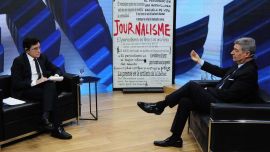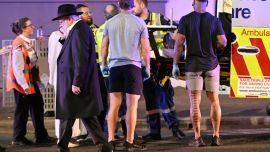Four members of the far-right group known as Revolución Federal have been indicted on allegations they incited violence and hate.
The group’s leader Jonathan Morel was charged on Thursday by Federal Judge Marcelo Martínez de Giorgi with "incitement to hatred, intolerance and collective violence against a president." Three others – Leonardo Franco Sosa, Gastón Ezequiel Ángel Guerra and Sabrina Basile – will also face the same charges, according to the judge’s ruling.
The leaders of Revolución Federal were accused of "publicly inciting hatred, intolerance and collective violence against a president in a specific context, to the point of effectively making a person carry out what, in the words of the members of Revolución Federal, was to 'go down in history' – i.e. to make an attempt on the life of the vice-president."
The indictments handed down by Martínez de Giorgi are part of a parallel case to the one investigating the failed assassination attempt against Vice-President Cristina Fernández de Kirchner, which took place on 1 September.
The group's actions were a "chronological succession of violent, persecutory and intimidating conduct against authorities of the current national executive branch," wrote the judge. Its members "exceeded the exercise of freedom of expression and the constitutional right to protest,” he added.
Morel and his affiliates first drew attention after erecting a guillotine in the Plaza de Mayo in what they maintain was a legitimate act of artistic and political expression.
But according to Thursday’s ruling, the controversial activists are guilty of having demonstrated against the government with "the purpose of imposing their ideas and combating those of others, instilling fear in the population and forcing national public authorities to refrain from going out into the streets in safe conditions, to cancel press conferences for fear of future harm, or appearing in public with their supporters.”
The judge noted that the far-right group had "suspiciously stopped publishing their activity" on social networks since the attempted murder of Fernández de Kirchner, who served as president from 2007 to 2015.
The move comes just two days after the quartet’s release was ordered by judges from a federal appeals court in Buenos Aires, a decision that prompted outrage from Frente de Todos leader Alberto Fernández.
On Wednesday afternoon, the president took to Twitter to criticise the decision, accusing the presiding judges of political bias and calling for the Supreme Court to intervene.
“It seems that far from wanting to clarify the fact and reach those most responsible, they are determined to cover up the obvious: that a criminal gang with ramifications and dark financing attempted against the life of the vice-president of the nation,” alleged Fernández in a post to his 2.2 million followers on the social media site.
Revolución Federal has become a magnet of criticism for politicians from the ruling Frente de Todos coalition, especially in the wake of the assassination attempt. Though direct links are unclear, Prosecutor Gerardo Pollicita argued what many government sympathisers believe: that the group's actions "led to the establishment of a state of social alarm.”
The failed shooting attack occurred outside Fernández de Kirchner’s flat in the wealthy Buenos Aires neighbourhood of Recoleta. Mingling among the vice-president’s supporters, 35-year-old Fernando Andrés Sabag Montiel emerged from the crowd and pulled the trigger of a .32-calibre pistol inches from her head. The gun, however, failed to go off.
Sabag Montiel and his girlfriend Brenda Uliarte, 23, are being held and charged with "attempted aggravated homicide" by Judge María Eugenia Capuchetti, who is in charge of the case.
Uliarte had previously attended one of the anti-government demonstrations organised by Revolución Federal.
The judge leading the case considers that there is insufficient evidence to merge the two investigations.
– TIMES/NA/AFP






















Comments